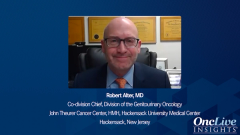
Lenvatinib + Pembrolizumab as Frontline Therapy for Advanced Renal Cell Carcinoma
Dr Eric Jonasch discusses why he chose to treat his patient’s advanced renal cell carcinoma with lenvatinib-pembrolizumab and how he modifies the dosage throughout treatment.
Episodes in this series

Sumeet Bhatia, MD: In your practice, Dr Jonasch, how did you go about choosing for this patient pembrolizumab-lenvatinib, considering that there may be other treatment options, including nivolumab, Cabometyx [cabozantinib], or the old regimen that has been there for some time, including pembrolizumab-axitinib? How did that guide your decision-making on what companion drug to choose with I/O [immuno-oncology] therapy?
Eric Jonasch, MD: It’s a challenging question. We certainly have, from an I/O–TKI [tyrosine kinase inhibitor] perspective, some excellent regimens. Probably the big decision point is which patients do you give I/O–I/O to, and which patients do you give I/O–TKI? But the lenvatinib-pembrolizumab does have numerically superior objective response rates, complete response [CR] rates, as well as progression-free survival, compared with some of the other I/O–TKI regimens. Though we have no head-to-head comparisons, in this individual, I was looking for a guarantee of a substantial response and a potential for a CR. I was a little concerned if I wasn’t going to get it right in the first round that this patient may end up getting into trouble. You know, we could say that the other regimens, if lenvatinib-pembrolizumab didn’t exist, would have been a great choice as well. But that’s what drove my decision-making.
Sumeet Bhatia, MD: In our practices, we never used lenvatinib prior. Earlier in other diseases, there have been issues in managing toxicity, including hypertension, nausea, and proteinuria. Has that in any way led you to change the starting dose or consider other monitoring modalities, which help ensure compliance and maintain dose intensity?
Eric Jonasch, MD: We also participated in the clinical trial with lenvatinib-pembrolizumab and were a little nervous initially about the 20-mg dose. But for a lot of patients, as long as you’re proactive about dose withholding and dose reducing, we were able to navigate the toxicities. The main thing is educating the patient that it’s OK to let us know they have toxicity, it’s OK to hold, and it’s OK to dose reduce. I point out to patients that some of the studies show that the people who need a dose reduction are the ones most likely to respond. It gives them that sense of reassurance that it’s OK to do that. That way, we create this partnership with the patient and the family members. They’re not afraid to tell us about the adverse effects, and then we can get ahead of them. We get the patient to be in the driver’s seat from a toxicity-management perspective. With that, we’re able to do this. Are there some individuals whom I would look at and start at a lower dose of lenvatinib? Yes. I’m concerned the toxicities themselves could drive issues with the ability to get a drug into the patient. There may be situations where I would do that. But it’s an interesting challenge.
Sumeet Bhatia, MD: Will you comment on the fact that when we use pembrolizumab-axitinib, we start at a smaller dose of axitinib and accelerate up? When I was reading the abstract about pembrolizumab-lenvatinib, it categorically says not to start at a lower dose because of lack of response. Can you discuss how you incorporate this in your practice? Do you consider this to be real? Has it changed your approach on how to handle the TKI, from pembrolizumab-axitinib to pembrolizumab-lenvatinib, and vary the approach of the introduction of them initially?
Eric Jonasch, MD: Yes, the evidence of absence vs absence of evidence is the challenge. We have an absence of evidence that starting at a lower dose is inferior from a clinical trial perspective. But from a real-world perspective, I’ve definitely seen that. I’ve started at lower doses and have seen benefits. In general, from a standpoint of making sure we adhere as closely as possible to guidelines, starting at the recommended dose is generally something we want to do. With regard to axitinib and dose escalation, I find that for many patients, 5 mg twice a day of axitinib is the sweet spot of their tolerability. Although there are recommendations for dose escalation—about 20% of patients on the axitinib-pembrolizumab study had dose escalation—it’s something we don’t do as much in clinical practice. In the end, we have to listen to the patients from a standpoint of their toxicity. [We want to] titrate into the zone, where we think they’re getting a pharmacodynamic effect of the drug, but make sure they’re not getting into trouble from a toxicity perspective.
Sumeet Bhatia, MD: What’s your standard protocol for monitoring high blood pressure and urine protein in patients who are on lenvatinib? How often have you had to do a dose reduction for that?
Eric Jonasch, MD: Proteinuria is something that’s unique to lenvatinib-pembrolizumab. We follow these individuals with urinalyses. There have been cases where we’ve needed to dose reduce. It’s in the low single-digit percentage rate. From a perspective of hypertension and other toxicities, we have patients monitor their hypertension and other toxicities internally or when we see the patients in clinic, where they are getting their infusions every 3 weeks. Initially, we make sure they’re seen regularly so we’re staying ahead of these toxicities.
Sumeet Bhatia, MD: Is there a preferred antihypotensive that you use?
Eric Jonasch, MD: I don’t have a preference. We’re often using calcium channel blockers because of their simplicity and ease of use. ACE inhibitors can be a very reasonable choice as well.
Sumeet Bhatia, MD: I’m going to ask you 1 question specifically base on your patient. How long will you continue immunotherapy after having achieved complete remission in renal cell carcinoma [RCC]? How long will you continue a TKI [tyrosine kinase inhibitor]?
Eric Jonasch, MD: For this patient, because they’ve now been in a CR for a year after having responded, we ended up taking this patient off both; so far so good. But these are unanswered questions, and the way to formally test this in patients in CR with these combinations is to do a randomized discontinuation trial. That’s not happening right now, so for people who are in a CR for a year, who remain on systemic therapy, we’ve been discontinuing them. It’s not evidence based, but it’s practicality and patient preference based in a number of cases. Could you continue them on the therapy? You could, but we don’t have data.
Sumeet Bhatia, MD: From my standpoint, I have. Being a generalist, I think about melanoma. I want to stop and think about lung cancer, and I don’t. In a situation, with lung cancer, for example, a rechallenge with immunotherapy had a far inferior response rate compared with melanomas. Certainly, people have started introducing this idea of MRD [minimal residual disease] based on circulating tumor cells, which may be an area for research. But is there anything being done at [The University of Texas] MD Anderson [Cancer Center] in that territory to help guide decision-making?
Eric Jonasch, MD: The standard platforms are not sensitive enough for RCC. There are platforms that exist that are undergoing evaluation that probably do have the sensitivity. At this point, they’re not ready for prime time, but I see an MRD type of molecular marker in our future. I’m not sure exactly when, but Dr Bhatia, when we have this conversation 5 years from now, we might be talking about that.
Transcript edited for clarity.










































